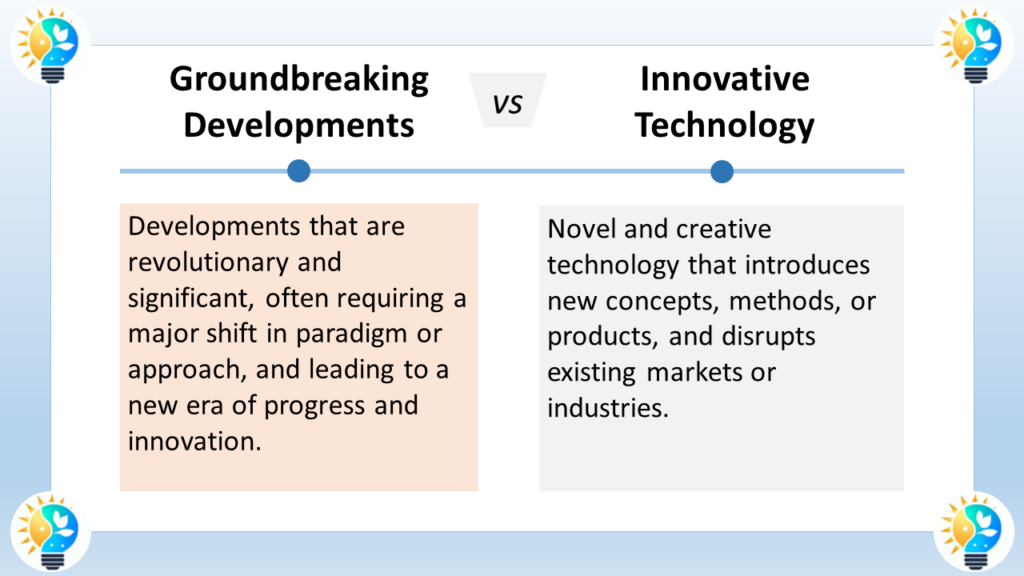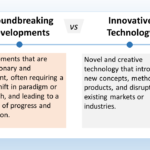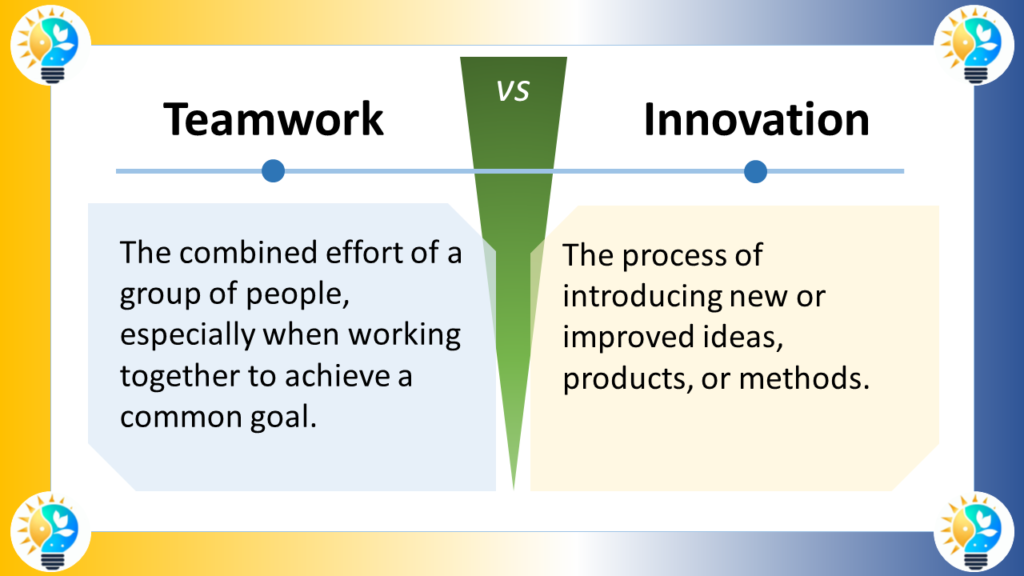Both groundbreaking developments and innovative technology propel progress, but while groundbreaking developments often signify a shift in paradigm, innovative technology actively introduces new concepts or products to drive progress.

When examining the progress of technology and its impact on society, it’s important to differentiate between Innovative Technology and Groundbreaking Developments. These terms, while occasionally used interchangeably, denote different levels of impact and advancement in the field of technology.
Definitions
Defining Innovative Technology
Innovative Technology is characterized by novel applications or improvements in technology that offer better solutions to existing problems or address new issues. This innovation can result from incremental changes or the combination of existing technologies in unique ways.
Characteristics of Innovative Technology
- Incremental or modular improvements: Often represents a step forward rather than a leap.
- Practical application: Focuses on enhancing efficiency, user experience, or capabilities.
- Market adoption: Geared towards relatively quick adoption and integration into the market.
Defining Groundbreaking Developments
Groundbreaking Developments, on the other hand, are technological achievements that represent major leaps forward, often creating new industries or fundamentally changing existing ones. These developments can redefine what’s possible and alter societal paradigms.
Characteristics of Groundbreaking Developments
- Radical innovation: Represents a significant leap from current technologies.
- Paradigm-shifting: Has the potential to change existing frameworks and create new norms.
- Long-term impact: Effects felt over extended periods and across multiple sectors.
Exploring a Variety of Synonyms for Innovative Technology
- Advanced Technology
- Cutting-Edge Innovations
- Cutting-Edge Breakthroughs
- Disruptive Tech
- Emerging Technologies
- Forward-Looking Tech
- Futuristic Innovations
- Groundbreaking Developments
- High-Tech Breakthroughs
- Innovative Breakthroughs
- Inventive Solutions
- Leading-Edge Advancements
- Modern Technological Breakthroughs
- Progressive Advancements
- Next-Generation Technology
- Novel Tech
- Revolutionary Tech
- State-of-the-Art Solutions
- State-of-the-Art Innovations
- Trailblazing Innovations
- Visionary Tech

Innovation is considered as a driving force in progress.
It includes the introduction of novel ideas, methods, or products that bring positive change and advancement.
For more information about innovations, check our glossary
Innovative vs. Groundbreaking: Relationship and Relevance
Innovative technologies can be the precursors to groundbreaking developments. They lay the groundwork by pushing the envelope of what’s currently possible, paving the way for more significant changes. Groundbreaking developments often build upon a series of innovative technologies, combining them in ways that create a profound impact that resonates on a larger scale.
Contextual Use of the Terms
In the business landscape, companies may focus on developing innovative technologies to stay competitive and meet current market demands. Groundbreaking developments may be the result of extensive research and development efforts, often requiring significant investment and collaboration across industries and academia.
Examples of Utilization
A recent example of innovative technology is the implementation of 5G wireless technology. While it represents a significant advancement in communication technology, it is an evolutionary step from 4G, offering faster speeds and more reliable connections.
In contrast, the creation of the internet was a groundbreaking development. It changed the world in ways that were hard to imagine before its advent, affecting nearly every aspect of modern life from commerce to communication and beyond.
Comparison Innovative technology vs groundbreaking
Innovative technology and groundbreaking developments are related concepts but have distinct differences. Here is a breakdown of the differences between the two:
Innovative Technology:
- Innovation refers to making changes or introducing new ideas, methods, products, or models that enhance value for clients and workers [2].
- Innovative technology involves the application of new or improved technologies to create products or services that offer unique advantages or improvements over existing solutions [1].
- It focuses on making incremental enhancements or introducing small changes to existing products, services, or processes [2].
- Innovative technology adds value and may provide a competitive edge in the market [1].
- It is often associated with advancements in technology and can be applied to various sectors [2].
- The marketing approach for innovative technology is to highlight the added value or advantages it offers compared to competitors [1].
Groundbreaking Developments:
- Groundbreaking developments refer to the creation of entirely new products, services, or technologies that have never existed before [1].
- These developments break new ground and create new markets [1].
- Groundbreaking developments are characterized by their ability to revolutionize industries and bring transformative breakthroughs [2].
- They require demonstrating the benefits to customers because the need for such products or services may not be initially understood [1].
- Examples of groundbreaking developments include the introduction of the personal computer by Apple, the cross-silo data amalgamation engine for advertising by Google, and the machine to capture experiences by GoPro [1].
- Marketing groundbreaking developments involves showcasing the unique and transformative nature of the product or service [1].
In summary, innovative technology focuses on incremental improvements or enhancements to existing products or processes, while groundbreaking developments involve the creation of entirely new products or services that revolutionize industries and create new markets.
FAQ
Q: Can an innovative technology become a groundbreaking development?
A: Yes, an innovative technology can evolve or combine with other innovations to result in a groundbreaking development that has a far-reaching impact.
Q: Are groundbreaking developments always immediately successful?
A: Not necessarily. The adoption and integration of groundbreaking developments can take time and may face initial resistance or unforeseen challenges.
Q: How do organizations identify potential groundbreaking developments?
A: Organizations often look to long-term trends, invest in substantial R&D, and stay attuned to scientific discoveries and technological advancements to identify potential groundbreaking developments.
Q: Why is investment in innovative technology important if groundbreaking developments have more impact?
A: Investment in innovative technology is crucial because it often provides the necessary steps toward groundbreaking developments and can offer immediate improvements and competitive advantages.
Q: What’s an example of a groundbreaking development in recent times?
A: The development and rapid deployment of mRNA vaccine technology in response to the COVID-19 pandemic is considered a groundbreaking development due to its potential to revolutionize vaccine development for other diseases.


